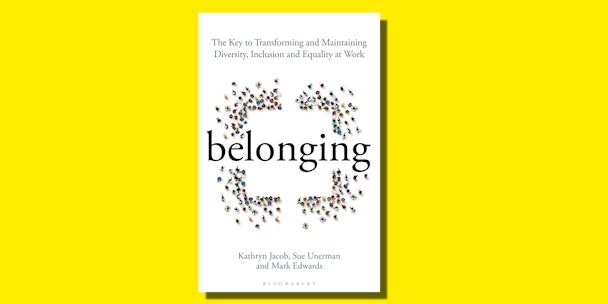How agencies can become kinder, more inclusive workplaces
Despite diversity and inclusion initiatives, the workplace is still a hostile environment for millions of people. As part of The Drum’s Agencies4Growth festival, ad veterans Sue Unerman and Kathryn Jacob sat down to discuss their new book, which tackles belonging in the workplace and offers practical advice on how to overcome barriers.

Sue Unerman and Kathryn Jacob sat down to discuss their new book that offers practical advice on how to overcome barriers
You’re more likely to become a chief exec if you’re called Steve, than if you have a uterus. Women and minorities make up only 34% of the boards of Fortune 500 companies. One in three of the working population in the UK feel they don’t belong in work.
The sad fact is, despite ‘efforts‘ to make the workplace more inclusive, structural racism still persists and the boardroom is still configured by patriarchy.
In the wake of the Black Lives Matter protests this year, brands and agencies have grappled with how to make their workforce more inclusive, spurred on by professionals in the industry.
Back in June, 600 Black advertising professionals signed an open letter that demanded urgent action from leadership to address its ’boy club’ mentality. That followed the United Nations and the World Federation of Advertisers establishing a series of measures to hold brands to account when it comes to the diversity of their workforces, while Creative Equals, a body dedicated to promoting diversity in the workplace, coordinated an open letter asking the UK’s largest agencies to pledge their solidarity.
And pay disparities are still holding people back. Only last year, analysis by The Drum revealed the median gender pay gap had worsened at more than half of the UK’s advertising and marketing agencies.
It‘s 2020 and it‘s hard to comprehend why the workplace still systematically alienates and represses certain individuals, by virtue of their colour, their gender, their sexual identity or their disability. Particularly when you consider that it has been proven time and time again that diversity makes a business stronger. According to a report from McKinsey, companies with diverse management teams report 19% higher revenues and are far more likely to perform above their industry medians.
Four years ago, Sue Unerman, the chief transformation officer at MediaCom, and Kathryn Jacob, the chief exec of Pearl & Dean, wrote The Glass Wall, a guidebook that gave women the tools they need to master any situation.
“Four years on from publishing our last book, we’re still seeing the same picture – despite all the talk about diversity and inclusion, despite all these initiatives,“ says Unerman. Which is why she and Jacob are back with a second book, Belonging, written alongside Mark Awards, the chief music critic for The Sunday Times.
Featuring interviews with 200 international businesses about the irrefutable business case for diversity at work, the book reveals some key barriers businesses face when it comes to diversity and inclusion, and ways to overcome them. And despite Unman and Jacob’s work background, the book isn’t specifically about advertising, media or cinema – it’s about the workplace in general.
Comparing this book to The Glass Wall, Jacob thankfully notes that, this time around, there is a lot more discussion about ‘diversity fatigue‘. “The interesting thing about diversity fatigue is it affects people for whom diversity initiatives are meant to work; those underrepresented groups who are tired of yet another training day and yet another initiative.“
She calls this the ‘bake sale syndrome‘, whereby for one day, people adopt a cause to ‘raise awareness‘. “But then the day is done. What about the other 364 days in the year? What about every single interaction during the working day?“ she asks. “Diversity fatigue doesn’t just affect those underrepresented groups, it causes a backlash towards straight white men – many of whom are in positions of power who feel as though they are being left out.“ And those straight white men are exactly the people Unerman and Jacob want to talk to in this book. Why, the book asks, aren‘t more men engaged with diversity and inclusion initiatives?
The crux of the issue is the creation of an authentic culture of belonging that benefits everyone – one that is driven by ‘everyone‘. Unerman says: “Without the involvement of everyone in the workplace, diversity initiatives will not succeed. We need everyone, from the newest recruits to the most established who sit in the seats of power to understand and implement strategies for belonging.”
She goes on to say that businesses need to make the diversity mix work by making staff feel they belong. “That‘s not just for people from underrepresented groups, it‘s about the straight white men who may be feeling a bit threatened. Make them feel that they are part of creating this change and that they‘re going to change the culture of that organization.“
Stressing the need to contemplate one‘s own everyday interactions, however well-intended, she says behaviours such as microagressions were raised a great deal during the research for the book.
“Sometimes, microaggressions are well intended – perhaps somebody is trying to compliment somebody on their appearance, but they do so in a way that is inappropriate or makes them feel uncomfortable. What can we do about this?“ Unerman asks.
She says there are two ways to resolve such issues; speaking up when we see or hear it and countering it with ‘micro affirmations‘ – both things that you can do in the workplace to include somebody and make sure that those who are underrepresented feel included.
Jacob and Unerman spoke with The Drum at Agencies4Growth Festival, a week-long online event celebrating the power of agencies to support businesses. You can watch the interview in full here.
Sign up to watch forthcoming sessions and see the full Agencies4Growth schedule here.

